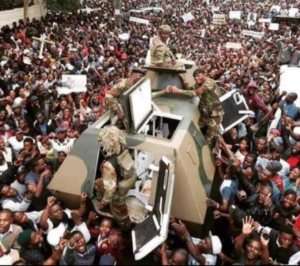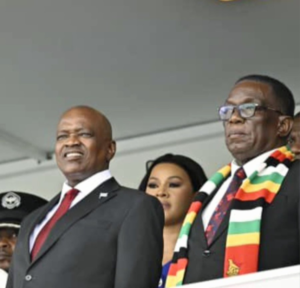BRIDGING THE PAST AND PRESENT: ZIMBABWE’S CHIEFS TO LEAD GUKURAHUNDI GENOCIDE HEARINGS

In a significant move towards national healing and reconciliation, Zimbabwe’s National Council of Chiefs has embarked on a groundbreaking mission to address one of the country’s most traumatic episodes – the Gukurahundi genocide. The Deputy President of the Council, Chief Fortune Charumbira, in a conversation with veteran journalist Ezra “Tshisa” Sibanda in Bulawayo, shed light on the imminent outreach programme aimed at gathering firsthand information and data on the atrocities committed during the dark period between 1982 and 1987.
The Gukurahundi, a term that evokes deep-seated emotions and memories among Zimbabweans, refers to the brutal campaign carried out by the Five Brigade, an elite military unit. The operation resulted in the massacre of an estimated 20,000 people, primarily from the Ndebele ethnic group, marking one of the most polarising and painful chapters in Zimbabwe’s post-independence history.
Under the leadership of Chief Mtshane Khumalo, a descendant of the legendary Ndebele military strategist General Mtshane Khumalo, the National Council of Chiefs is poised to undertake this sensitive task. General Khumalo was renowned for his leadership of King Lobengula’s Imbizo regiment, which delivered a significant blow to colonial British forces at the Battle of Pupu in 1893, marking a historic moment of armed resistance against colonialism.
The outreach programme, as outlined by Chief Charumbira, will unfold in two phases, focusing initially on Matabeleland North and South provinces, followed by the Midlands province. Through public hearings, the initiative aims to provide a platform for survivors and families affected by the Gukurahundi to share their stories, experiences, and the impact of the violence on their lives. This process is not just about documenting the past but is a vital step towards understanding the depth of the wounds inflicted and the long journey towards healing and reconciliation.
The choice of the National Council of Chiefs to lead this process is both symbolic and strategic. As custodians of culture and tradition, the chiefs hold a revered position in Zimbabwean society, potentially facilitating a more open and empathetic dialogue among the affected communities. Their involvement underscores the importance of traditional leadership in bridging the chasm created by historical injustices and fostering a sense of unity and national identity.
The Gukurahundi outreach programme represents a crucial endeavor in confronting and acknowledging the atrocities of the past. By creating an inclusive space for dialogue and truth-telling, Zimbabwe takes a pivotal step towards mending the fabric of a nation torn by violence and division. The initiative not only honors the memory of those who lost their lives but also signals a commitment to ensuring that such dark chapters do not find their way into the future annals of the country.
As Zimbabwe embarks on this path of reflection and reconciliation, the leadership and vision of the National Council of Chiefs offer a beacon of hope. By acknowledging the scars of the past, the country can pave the way for a future where peace, unity, and justice prevail, ensuring that the lessons learned from the Gukurahundi genocide are never forgotten.



